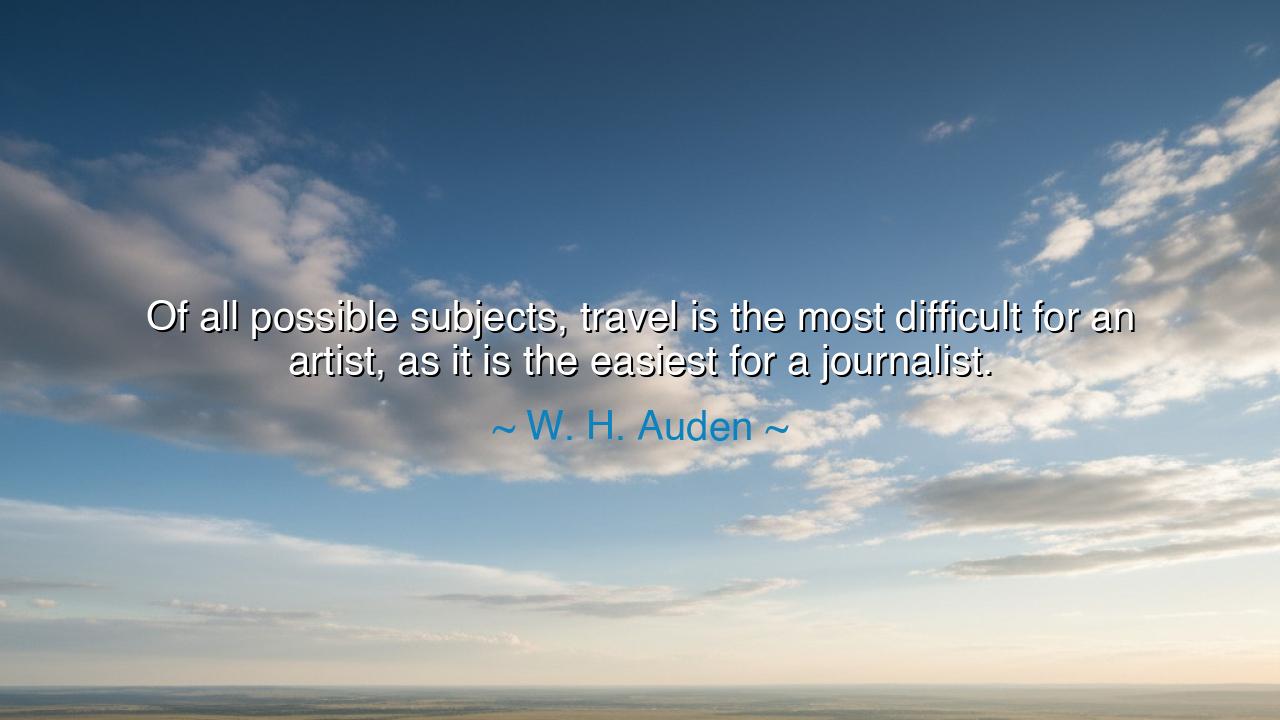
Of all possible subjects, travel is the most difficult for an
Of all possible subjects, travel is the most difficult for an artist, as it is the easiest for a journalist.






In the voice of the poet, truth is often revealed with paradox. So spoke W. H. Auden, master of words and wanderer of many lands: “Of all possible subjects, travel is the most difficult for an artist, as it is the easiest for a journalist.” These words carry the weight of ages, for they reveal the difference between seeing the world with the eye that records and the eye that creates. For the journalist, the road provides endless material, facts to be written down, events to be catalogued, impressions to be quickly captured. But for the artist, who seeks not the surface but the soul, travel is treacherous terrain.
The journalist thrives on immediacy. The ship departs, the market bustles, the festival erupts with color—he describes it, swift and clear, and his task is done. But the artist must wrestle with deeper truths. To him, a journey is not merely movement through places, but through meaning. How shall he render the hush of dawn upon a foreign shore? How shall he capture the ache of exile or the revelation of standing in a city older than memory? His work is not to report but to transform, to distill the fleeting into the eternal. Thus, while the journalist finds ease in travel, the artist finds it a sacred burden.
History gives us proof. Consider Marco Polo, who returned from the East with stories that dazzled the courts of Venice. To the journalist’s eye, these were treasures already: descriptions of silks, spices, and great cities, strange customs and magnificent rulers. The facts themselves were enough to astonish. Yet when artists centuries later drew from his accounts, they wrestled with deeper questions: What do these encounters mean for the soul of man? What do they tell us about the vastness of the human condition? The one recorded; the other interpreted. The one gave us chronicles; the other gave us vision.
The ancients knew this distinction well. When Herodotus wrote his histories, he often slipped into the work of an artist, weaving myths and legends with events. Yet Homer, though perhaps he never saw Troy with his own eyes, gave us not a report but a vision of longing, wrath, and destiny. Both men spoke of journeys and wars, but their aims were different. One sought to preserve memory, the other to reveal meaning. Thus Auden’s wisdom reminds us: travel is easy to describe, but exceedingly hard to transform into art.
What then is the lesson for us? It is this: when we travel, we must decide how we will see. Will we look with the eyes of the journalist, content to record the sights and sounds, to gather stories as curiosities? Or will we look with the eyes of the artist, seeking to understand what lies beneath, to wrestle with the truths revealed by place, by people, by the endless road? Both paths have value, but only the second leads us to transformation.
This lesson extends beyond travel. In life itself, every encounter can be treated as a report or as a revelation. When hardship comes, you may merely recount it as fact—or you may search for its meaning, its lesson, its place in the great tapestry of your journey. When joy comes, you may merely describe it as an event—or you may distill it into wisdom, something to be carried forever. To live as an artist is to seek meaning, even in the smallest of steps.
Practically, this means slowing down. Do not merely record what your eyes see; ask what your soul feels. When you walk through a new city, do not just note the architecture—ask what it says about the people who built it. When you meet a stranger, do not just record their words—listen for the heartbeat beneath them. Keep a journal if you must, but let it be more than record-keeping: let it be a vessel of reflection.
Thus, Auden’s words endure as both challenge and guide. The journalist may find ease in travel, but the artist must labor greatly to turn the fleeting into the eternal. And yet, this is the nobler path, for art preserves what memory cannot. So let us all strive to be more than recorders of life—let us be interpreters, seekers, creators. For only then will our journeys, whether across oceans or within our own hearts, bear fruit that endures beyond the telling.






AAdministratorAdministrator
Welcome, honored guests. Please leave a comment, we will respond soon